Module 4 Seeing the doctor Unit 1 I haven't done much exercise since I got my computer
Module 4 Unit 1 八年级英语下册(外研版)
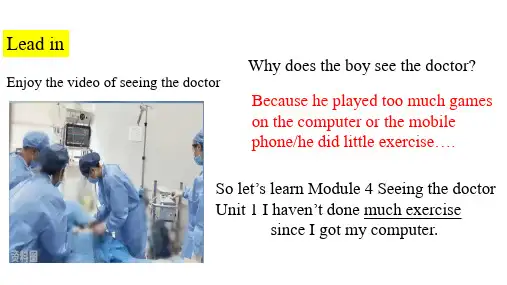
6.take your temperature 量一量你的体温 eg:Have you taken your temperature?你量体温了吗?
take常见的用法:
魔法
典记例忆完成句子。 (1)你最好先量一下他的体温。 You'd better __t_a_k_e___ _h_i_s_____ _te_m__p_e_r_a_tu_r_e__ first. (2)记得饭前吃药。
do more exercise
sleep well
eat more vegetables have more fruit
Language points
1. I feel ill. feel ill 感觉不舒服,感到身体不适。feel是系动词,后常跟形容词作表语,构成
系表结构。ill是形容词,意为“不健康的,生病的”,其比较级和最高级分别为 worse、worst。ill 的名词形式为illness(疾病)。 例:You should go to the doctor if you feel ill. 如果你觉得不舒服,就该去看医生。
【拓展】器官名词后缀-ache表示部位疼痛
tooth+ache = toothache (牙痛) head+ache = headache (头痛) back+ache= backache(背痛) stomach+ache = stomachache(胃痛) ear+ache= earache (耳朵痛) heart+ache= heartache(心痛)
例:That’s why he got angry with me. 那正是他对我生气的原因。
Tom overslept this morning. That is why he was late for work. 汤姆今天早晨睡过头了。 那就是他上班迟到的原因。
Module_4_Unit_1_I_haven't_done_much_exercise_since_I_got_my_computer.

2. That’s the problem! 这就是问题所在! 这里使用定冠词,表示“这就是问题所在”,
the problem 指造成大明胃病的原因。
如果用不定冠词a, 意思就相去甚远。
3. Do you do any exercise? 你锻炼身体吗? exercise,不可数名词,没有复数形式。 do/ take/ get (some) exercise
提问多长时间或物体的长度。
在现在完成时中,经常用于提问for和since短语。 你生病多长时间了?__________________________?
பைடு நூலகம்
Daming: I've got a stomach ache and a headache. Betty: Have you seen a doctor?
Daming: No, I haven't.
Betty:
You should go and see one!
Daming: OK. You don't look very well either, Betty. What's the matter with you? Have you got a fever? Betty: Yes, I've got a temperature... and a cough. Daming: You should see a doctor too. Betty: I've seen a doctor. I saw a doctor this morning.
Language points
1. I've got a stomach ache and my head hurts. 我胃痛,头也痛。
Module 4 Seeing the doctor
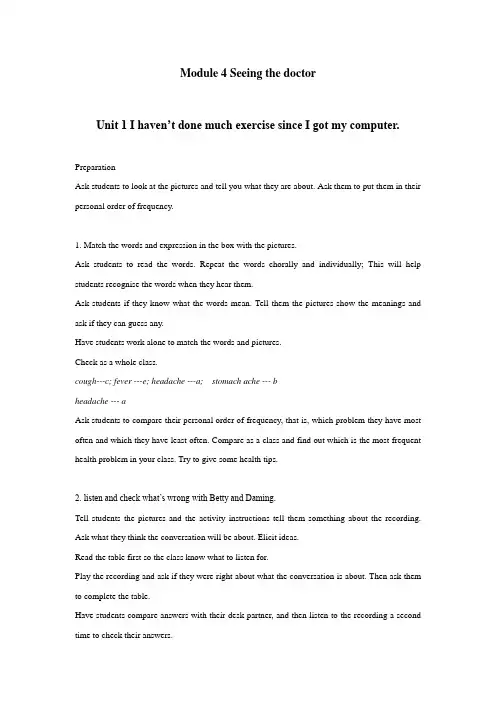
Module 4 Seeing the doctorUnit 1 I haven’t done much exercise since I got my computer.PreparationAsk students to look at the pictures and tell you what they are about. Ask them to put them in their personal order of frequency.1. Match the words and expression in the box with the pictures.Ask students to read the words. Repeat the words chorally and individually; This will help students recognise the words when they hear them.Ask students if they know what the words mean. Tell them the pictures show the meanings and ask if they can guess any.Have students work alone to match the words and pictures.Check as a whole class.cough---c; fever ---e; headache ---a; stomach ache --- bheadache --- aAsk students to compare their personal order of frequency, that is, which problem they have most often and which they have least often. Compare as a class and find out which is the most frequent health problem in your class. Try to give some health tips.2. listen and check what’s wrong with Betty and Daming.Tell students the pictures and the activity instructions tell them something about the recording. Ask what they think the conversation will be about. Elicit ideas.Read the table first so the class know what to listen for.Play the recording and ask if they were right about what the conversation is about. Then ask them to complete the table.Have students compare answers with their desk partner, and then listen to the recording a second time to check their answers.Check as a whole class.3. Listen and readTell students they are going to read and listen to a conversation between Darning and his doctor. Ask students if they remember the last time they went to the doctor's. Discuss and elicit typical questions that doctors ask and expressions they would expect to hear or use when speaking to a doctor.Write their ideas on the board under the headings "Questions" and "Expressions".Have students read and listen to the conversation and tell you if any of the ideas on the board are included.Ask students to find the phrases "my head hurts", "caught a cold" and. "be very harmful to your health" in the conversation, and then ask them to repeat them chorally. Check their pronunciation. Put students in pairs and tell them to look at the three expressions in the conversation and work out the meaning.Elicit ideas for the meanings from the class. Check that they are correct.Tell students they are going to read the conversation with a partner. Ask them to read it slowly and check if there are words they don't understand. Ask them to discuss the words with their desk partner and try to work out the meaning.Write the new words on the board. Repeat chorally to help recognise the pronunciation.Play the recording and ask students to read the conversation out loud,Put the class into pairs and allocate a character (the doctor or Darning) to each student in the pair. Play the recording again and ask them to read their part.Tell pairs to practise the conversation, imagining that they are professional actors.Invite pairs to perform the conversation for the class. Video record using a mobile phone orcamera, if possible, so that students can watch their own performance afterwards.Now complete the table about Daming.Tell students to look at the table and try to complete it from memory; referring to what Darning told the doctor. Allow them to work with their desk partnerHave students read and listen to the conversation again and check their answers. Tell them they should find three answers for "why" and for "what to do".Ask students to compare answers with a partner. Then check as a whole class.4. complete the passage with the words and expression in the box.Explain to students that they are going to complete the passage with the words in the box.Ask students to complete the passage with the correct words and discuss the answers with their desk partner.Check answers as a class.1. health2. stomach ache3. cough4. fever5. temperatureIntensionGive students two minutes to read the passage in Activity 4 again and memories as much as possible.Ask students to close their books and tell them you are going to read the passage to them. They should write down as many words that they hear as possible. They do not need to write sentences. Individual words are enough.Read the passage out loud at almost natural speed while students write down what they can.Put students in pairs to compare the words they have written down and to start reconstructing thepassage together in their notebooks, using their words and their memory.Remind them to think about spelling and grammar while they write the passage.After two or three minutes, read the passage again at an almost natural speed for students to check further and add information.Ask pairs to finish writing the passage down from memory; using all the words they have heard. When they have finished, have pairs check their work by comparing it with the original passage in Activity 4.Pronunciation and speaking5. Listen and notice the intonationTell students to look at the sentences and the small arrows. Tell them that the arrows indicate the correct intonation in these questions.Play the recording for students to listen to and notice what the voice does at the end of the questions.Ask a volunteer to imitate each question.Ask students to tell you which two questions can be answered with yes or no. Ask them to tell you if the intonation on these two questions is the same as or different from the intonation in Questions 1 and 2.Invite students to tell you their conclusions about the rule (intonation goes down at the end of open questions and up at the end of yes/no questions).Tell students to listen to the recording again and repeat the questions.Play the recording. Have students repeat chorally.Ask individual volunteers to say the questions. Encourage their classmates to clap if the intonation is correct.Tell students that when they want to tell someone how long an action has been happening using the length of time (the number of days, years, etc.), they need to use "for". Ask students to find an example in the conversation between Darning and his doctor.Divide the class into two halves--- As and Bs. Tell the As they are going to be doctors, and tell the Bs they are going to be patients.Put the As in groups of three and the Bs in groups of three. Tell the As to write down at least fivequestions they can ask their patients, looking at the conversation between Darning and his doctor for help.Tell the Bs to decide what problem they have, looking at Activity 1 for ideas, how long they have had it, and what the symptoms are.Tell students to read the conversation in Activity 3 again to remind them of a typical conversation in this situation.Put students in pairs to role-play a conversation between a doctor and a patient, using A's questions and B's ideas. Record the conversations if you wish.Unit 2 we have plated football for a year now.1. Describe the activities in the pictures. Which ones are healthy?Tell students to look at the pictures and tell you what they see. Write their ideas on the board.Ask students to write down the activities in the pictures under the headings "Healthy" and "Not healthy". Then ask them to compare their lists with their desk partner.Check answers as a whole class.b, c, d,eExtensionAsk students to put the activities in order of their preference or according to how often they do them.Tell them to compare their lists with their desk partner.2. Read the passage and match the people with the pictures in Activity 1. There is one extra picture.Tell students the passage tells the stones of four of the people in the photographs who are trying to have healthier lives. Ask them to predict the words and content. This will help them understand what they are reading.Discuss their ideas as a class and write their words on the board.Set a time limit of three minutes. Tell students to read the passage quickly and decide which of the activities in the pictures in Activity 1 each of the paragraphs talks about.Check answers as a class.Tell students to read again and see if they can find any of the words they predicted.Compare as a class.Anna---Picture e; Wang Wei--- Picture c Thomas --- Picture d: Richard --- Picture bPut students in pairs to write a quiz for their classmates. On the board, write "Find someone who has a dog" and "...does not like his new sport".Tell students to look for the answers and tell you who the sentences refer to, Anna, Wang Wei, Thomas or Richard.Check as a class.Tell pairs to write similar sentences starting with "Find someone who..." for their classmates to solve. Ask them to write at least six sentences.Monitor and help as necessary.When pairs have finished writing their sentences, tell the class to close their books.Pairs exchange sentences and try to match the sentences to the correct names from memory. Allow students to read the passage again to check answers.Learning to learnRead the information together and check meaning.Ask students to look at the four paragraphs in the passage and decide which one is asking for advice. Then ask them to tell you how they know.3. Complete the notes.Have students read the sentences and complete the notes from memory.Play the recording again for students to check answers.Check answers as a whole class.1. well2. exercise3. do a; walk4. first5. year; fit6. underground 7 .bike 8. smile 9. week 10. enjoy 11. weak4. Complete the sentences with the words in the box.Read the words in the bos with students and check their pronunciation.Ask students to repeat the words chorally.Have students read the sentences and check their understanding.Working individually, students complete the sentences with the words in the box.Have students compare answers with their desk partner before checking as a class.1. condition2. active3. awful4. member5. perhaps6. dailyWriting5. Work in pairs. Look at the pictures of Colin. Wrote notes and explain …Put students in pairs and tell them to look at the pictures and discuss. Ask them to tell you what Colin is doing in each picture.Have students read the questions and, working with their partner, write notes to answer them. For example:Colin's problem --- eating junk food, too heavy, : not very fitDoctor's suggestion --- getting some exercise and eating healthy foodWhat happens next --- doing exerciseHow he feels now --- feeling very well and happyCompare ideas and discuss as a class.Now write fore sentences to describle what happened.* Working individually, students write four sentences imagining, they are Colin.1.didn't feel very well,1 was too heavy and I ate too much last food.2. My doctor said I should set some exercise and eat healthy food.3.I went exercising.4.Now I feel very well and happy.5.Write a passage about healthy living. Use the sentences you wrote in Activity 5 to help you. Tell students to write a complete passage about healthy living;, imagining they are Colin. Tellthem to write a first draft using their sentences and notes from Activity 5 and add more information.When they have finished their first draft, put students in pairs to read and correct each other's passage, focusing on spelling and grammar. Ask them to check that they have included some new words from the module.Have students write a final copy of their passage.Unit 3 Language in useAsk students to think of three situations in their lives that started in the past and still continue. Tell them to write them down. For example:I live near my grandparents.I study at this school.I haven't seen my glasses.Read the sentences in the box as a class and ask students to tell you what "for" and "since" mean. Ask students to rewrite their three situations, using the present perfect and "for" or "since", so that the y can tell people how long this situation has been happening. For example, I’ve lived near my grandparents since I was born./ I’ve studied at this school for many years./I haven't seen my glasses since the weekend.Monitor and help as necessary. Then ask three or four students to write some of their sentences on the board as examples.For & SinceTell students to look at the sentences in the language box and tell you where '"for" and "since"go in a sentence.Draw students' attention to the feet that these words are frequently used with the present perfect. Point out that the difference between “for" and "since" is as follows:for + (length of time); for three weeks, for five minutes, for three centuries^ since + (when the situation started); since winter, since my birthday, since this morningRead the questions to the students. Then ask them to listen and repeat. Help with pronunciation and intonation as appropriate.1.Work in pairs. Ask and answer the questionsHave students read the questions and write their answers, using complete sentences. Monitor as necessary.Put students in pairs to take turns asking and answering the questions.Ask individual students to report to the class about their partner's answers.2. Complete the questionnaire about healthy living. Use since or for where necessary.Have students read the questions and think about their answers for a minute.Tell students to write their answers using "since" or "for" wherever appropriate.Have students compare answers with their desk partner and correct each other's spelling and grammar. Ask them to focus on the correct use of "since" and "for" in particular. 'Put students with a different partner to take turns asking and answering the questions.Ask students to report back to the class about their partner's answers to the questionnaire.plete the sentences.Put students in pairs.Tell them to read the short dialogues and decide how many of them could be at the doctor's. Check ideas as a class.Ask pairs to complete the conversations with words in the correct form, using the time expressions to help. Tell them all the words are "have + participle" forms.Check answers as a class.1, been/felt 2. seen 3. walked 4. been 5. have; had4. Complete the passage with the words and expressions in the box.Play a vocabulary game (see "Methodology tip" below) to review the words and expressions in the box.After reviewing the words and expressions in the box, put students in pairs to complete the text. Check as a whole class.1 well2 coughs3 exercise4 last food5 weak6 cold7 stomach ache5. Complete the conversation with the sentences in the box.Have students read the conversation and complete it with the sentences in the box. Tell them to refer to Darning's conversation with his doctor in Unit 1 if necessary.Have students compare answers with a partner. Check answers as a whole class.Work in pairs. Read out the conversationPut students in pairs to practise the conversation between Bill and his doctor. Set a time limit of five minutes.Ask volunteers to perform for the class.If you wish, ask students to role-play the conversation without referring too closely to the script, making any small changes they like.1. Can I help vou?2. How long have you been like this?3. That’s that.4. What's wrong with me?6. Read the passage and match the problems with the advice.Tell students to cover the passage. Read the three pieces of advice given below the passage, either as a class or individually.Using the advice as clues, ask students to guess what the problems are. Write their ideas on the board.Play the recording for students to listen to and try to match the problems with the advice.Have students then read the three problems and check their answers.Allow them to compare answers with their partner before checking as a whole class.Ask students to read the problems and advice again and tell you if there are any new words. Check meanings using a dictionary or by looking at the context.Work in pairs. Do you have similar problems? Talk about your advice.Ask students to think of a problem they have (tell them they can make one up), with what they eat or with how much time they spend on the computer or on video games. Encourage them to use their imagination.Ask them to write down the problem and help with any words they may need.Put students in small groups to take turns explaining their problem and then asking for and giving advice.Ask a member of each group to report to the class about some of the problems and the advice they gave in their groups.Discuss the advice as a class.1 --- b;2 --- a;3 --- c7. Listen and complete the passage.Make sure the students read the passage carefully before listening so they know exactly what they will be listening for.As a class, discuss what kind of words students will need to use to complete each gap,Play the recording for students to listen to and complete the sentences. Play the recording twice if needed.Allow students to compare answers with their desk partner before playing the recording one more time.Check answers as a whole class.1. awful2. very tired3. three days4. headache5. stomach ache6. drink more water7. three times8. stay in bedAround the worldRead the passage with the class. Ask them to find words with meanings related to health. Check students know the meaning of these words.Discuss with the class how important they think the work of the WHO is. Find out if they think it would be good to work for the WHO or not.Ask students to close their books and, with their desk partner, try to remember as much as possible about the passage.Elicit as much information about the passage as possible from the class and write it on the board. Allow students to read the passage again to check if the class has forgotten any information.Module taskDoing a survey to find the most suitable exercise for you.8. Work in groups. Do a survey to find what exercise your group members do and the effects.Tell students they are going to do a survey. Ask them to read the questions and predict the most popular answer to each, writing their answers down on apiece of paperHave students keep their predicted answers secret and hand them to you.Ask students to make a table to write the results of their survey.Divide the class into four or five groups. Tell them to ask the questions within the group and note down the answers.When they have finished, form new groups of four or five by taking one student from each of the groups and putting them together. Tell them to exchange information to complete the class picture. Still working in their groups of four or five, students write a paragraph summarising their class's answers to the questions. Collect the paragraphs and make an information poster. Ask a student to illustrate the poster with a graph.9. Decide what exercise Is the most suitable for you.Have students look at the different types of exercise their classmates named in the class survey. Tell them to choose the type of exercise they think is the most suitable for them and think of reasons.Tell student to write two or three sentences explaining their choice.10. Talk about you’re your decision and your decision and your reasons with the rest of the class. Ask individual students to read out their sentences.。
Seeing__the__tor校级公开课
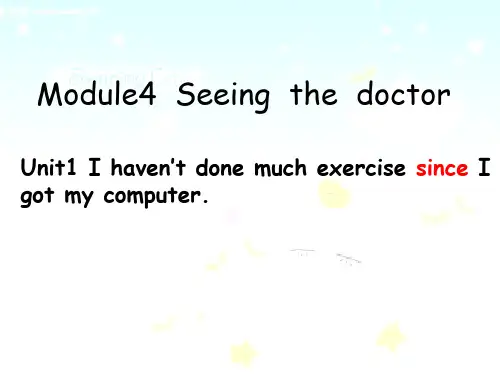
C. Since Friday
Let’s read
Illness
Stomachache and headache
Now complete the table about Daming.
How long have you had it?
I have had it for two years. I have had it since last year.
I have watched a lot of films since I got my computer.
do my homework(×) visit my friends (×) play games a lot (√)
drinks.
Cold
Go to see the doctor. Wear warm clothes. Drink a lot of water. Have a good rest.
Stomach ache
Go to see the doctor. Wear warm clothes.
Don’t eat anything cold.
…
do much exercise (×) go out with my family (×)
chat on line (√)
I have/haven’t___________ since I got my computer
He has had a headache since he got the computer.
I have learnt English for about 12 years.
外研版八年级下册英语M4U2教学设计教案4
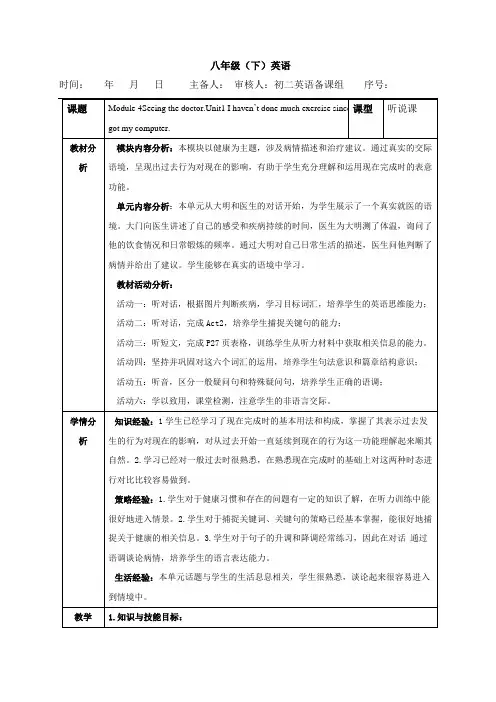
任务二:话题导入,听力训练。
1.导入Have students work alone to match the words and pictures
【听力素材的学习】
Listen and check what’s wrong with Betty and Daming.(听两遍,根据图片获取相关词汇搭配)
back+ache=backache(背痛)stomach +ache = stomachache(胃痛)
2)take one’s temperature意为“量体温”
3)That’s why you’ve got a stomach ache.这就是你得胃病的原因。
That’s why(+结果)这就是…的原因。
Listen and check (√) what’s wrong with Betty and Daming
cough
fever
headache
stomach- ache
toothache
Betty
Darming
3互帮. Check the answers in groups or in class. And try to read the sentences correctly.
重点:掌握现在完成时与一般过去时的区别。
难点:能角色扮演,谈论疾病及治疗办法。
教学准备
多媒体,白板
教学课时
一课时
教 学 过 程
活 动 设 计
个人复备
一【感情调节】
任务一:新课导入,谈论学生生病的经历。
When you see a doctor , he usually asks you some questions like this:
M 4 Seeing the doctor u1
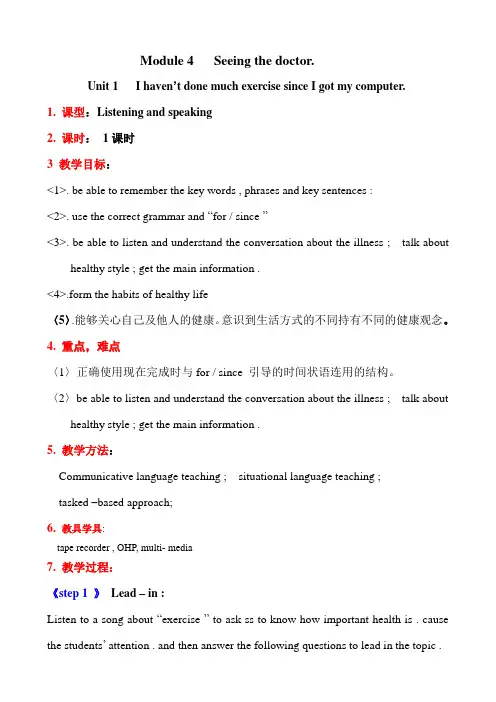
Module 4 Seeing the doctor.Unit 1 I haven’t done much exercise since I got my computer.1. 课型:Listening and speaking2. 课时:1课时3 教学目标:<1>. be able to remember the key words , phrases and key sentences :<2>. use the correct grammar and “for / since ”<3>. be able to listen and understand the conversation about the illness ; talk abouthealthy style ; get the main information .<4>.form the habits of healthy life〈5〉.能够关心自己及他人的健康。
意识到生活方式的不同持有不同的健康观念。
4. 重点,难点〈1〉正确使用现在完成时与for / since 引导的时间状语连用的结构。
〈2〉be able to listen and understand the conversation about the illness ; talk about healthy style ; get the main information .5. 教学方法:Communicative language teaching ; situational language teaching ;tasked –based approach;6. 教具学具:tape recorder , OHP, multi- media7. 教学过程:《step 1 》Lead – in :Listen to a song about “exercise ” to ask ss to know how important health is . cause the students’ attention . and then answer the following questions to lead in the topic .1, What did the song tell us ? 2. If you are ill, what should you do ?《step2》learn new words :Yes, we should see the doctor, what’s more , we should do much exercise , if not so, we will be ill. look. What’s wrong with the following people . through the pictures to solve the key words to learn the following listening and the dialogue .Key words: cough , fever , headache, fever, stomach ache , toothache<step3>work in pairs :Through the activity , to ask ss to remember the key words and revise the grammar A: Have you ever been ill before ?B: …….A: What kind of illness have you got ?B: I have got a……A: How do you feel when you are ill ?B: …..A: What should you do ?B: ……《step4》Listen and check:W hat’s wrong with Betty and Daming?《step5》listen and choose :How long has he been like this ? Friday , he has been ill about three days A: for B: since C. At D, on《step6》listen and answer :Why has he been ill ? answers :《step7》read and answer :To be healthy , What should he do ?First : Stop eating fast food ,eat breakfastSecond : get some exerciseThird: take medicine 3 times a day《step8》retell according to above《step9》enjoy and act in role《step10》language point :How long have you been like this? 你这样多长时间了?Since Friday. I’ve been ill for about 3days?Questions:1). How long : 经常用于提问什么时间状语?用于什么时态?2). Since / for : 和它们连用的动词: 持续?短暂?二者有联系吗?《step11》discuss :Observe the following pictures with the questions :How long have you learnt English ?Sinc e …years ago for… y earsHow long have you lived in your village ?Since you were born since 199.. / 200... For…. years结论:1.How long :常用于现在完成时2. 动词:持续动词3. for / since 关系since …ago = for …《step12》work in pairs according to the conversationD: what’s wrong / the matter / the trouble with you?P : I’ve got ….D:How long have you been like this ?P: I’ve …. for / since ….D: Have you had breakfast?P: …….D:《step13》【当堂巩固】II. 在文中找出下列短语并记忆。
外研版八年级下册英语 Module 4 Unit 1 I haven't done much
9.—Themeatis_______B_delicious. —Yes, butdon'teat________meat. A. toomuch; toomuch B. muchtoo; toomuch C. toomuch; muchtoo D. muchtoo; muchtoo
【点拨】muchtoo意为“十分; 很”,其后接形容词或副 词。第一个空格后为形容词delicious,故第一个空格用 muchtoo。toomuch意为“太多”,其后接不可数名词。 第二个空格用toomuch修饰不可数名词meat。
nameregistratifoenvieftrheyhavea________ ( 发 烧 ) andcoughhere.
5.
Ifyoudon'toftenhavebreakfast,
you'llsufferfromabasdt_o_m_a_c_h_a_c_h_e_____( 胃 痛).
二、根据汉语意思完成句子, 并背记英语句子 6. 你像这样多久了?
9. 我自从去年有了电脑以来, 就没多做运动。
I_____h_a_v_e_n_'t_d_o_nmeuchexercise________Igotmyc omputerlastyseianr.ce
10. 那可能对你的健康很有害。 Itcanbevery_______h_a_r_m__fu_lytoour_______h_e.alth
12. 别吃太多垃圾食品, 这对我们的健康有害。
Don't_ea_t______toomuchjunkfood. Itis__b_a_d____forourhealth.
13. Smokingdoesharmtoh. Weea'dltbhettergiveitup.
2020年春外研版英语八年级下册module 4 unit 1 i haven’t done much exercise since i got my computer
Module 4 Seeing the doctor Unit 1 I haven't done much exercisesince I got my computer.Ⅰ.根据句意及首字母或汉语提示完成句子1.You have a ________(发烧) and you should see a doctor.2.He can't come to the meeting, because he is ________(有病的) today.3. You look sad.Do you have a ________ (头痛) again?4.You may have a cold. Let me take your t________.5.Take the m________ three times a day.Then you will feel better.6.I haven't seen him s________ three years ago.Ⅱ.用括号中所给单词的适当形式填空1.—How long ________ you ________(study) Chinese, Tony?—Since 2002.2.My grandfather does ________(many) exercise to keep healthy.3.Junk food ________(be) harmful to your health.4.He failed his driving test three ________(time).5.Have you ________(catch) a cold?Ⅲ.用方框中所给单词或短语的适当形式填空stomach ache, not usually, problem,cough, look after, catch a cold,take one's temperature, harm1.Dear! You're coughing all the time. I'm afraid you've _____________.2. My grandma is old. Our family _____________her very well.3.—Do you take exercise?—No, _____________. I like going online when I'm free.4. —Listen! Tony is _____________ badly.—Let's take him to the hospital.5.Eating too much fast food is _____________ to your health.6.Tony, _____________ first before you take the medicine.7.—My son has a sweet tooth and he eats lots of candies.—That's the_____________. Tell him not to eat candies any more.8. Tom, don't eat too much ice cream. Or you will have a _____________.Ⅳ.根据汉语意思完成句子1.我胃痛,头(也)痛。
2020_2021学年八年级英语下册Module4SeeingthedoctorUnit1Ihave
Module 4 Seeing the doctorUnit 1【自测】根据课文内容填空,每空一词1. I’ve got a stomach ache and my head .2. —How long have you been like this? —Since Friday. I’ve ill for about three days!3. Let me take your temperature... Hmm, there’s fever.4. I haven’t done much exercise since I my computer last year.5. It can be very harmful to your .【过关】一、根据句意及中文提示完成句子,每空一词1. You must go to see a doctor if you keep (咳嗽) day and night.2. I have been (有病的) like this for about three days.3. Everyone should care about their (健康).4. Your temperature is a little high. You may have a (发烧).5. It’s easy to catch a (伤风) if you take a shower(淋浴) in winter.二、用方框中所给单词或短语的适当形式填空1. My aunt has been away from home she was five.2. You may have a without enough sleep.3. Don’t eat too much cold food, or you may have a .4. What does mean? I can’t under-stand it.5. Second, get some , such as running.三、根据汉语意思完成句子,每空一词1. 这小男孩害怕吃药。
Module 4 模块表格式教案
课题
Module 4 Seeing the doctor
Unit 1 I haven’t done much exercise since I got my computer.
课时安排
Period 1
课型
Listening and speaking
教学目标
1. The students will be able to understand present perfect with for and since.
Step 7Have a quiz.
Homework
教学反思
上课日期:年月日第课时
课题
Module 4 Seeing the doctor
Unit 2 We have played football for a year now.
课时安排
Period 1
课型
Reading
教学目标
1. The students will be able to talk about one’s health condition.
Step 5 Listen and notice the intonation
1.Ss read and predict which words the speaker is likely to read.
2.Now listen and check if it is right.
3.Work in pairs. Read the sentences aloud.
6. Role read the conversation in groups of 2 and try to understand the everyday English.
- 1、下载文档前请自行甄别文档内容的完整性,平台不提供额外的编辑、内容补充、找答案等附加服务。
- 2、"仅部分预览"的文档,不可在线预览部分如存在完整性等问题,可反馈申请退款(可完整预览的文档不适用该条件!)。
- 3、如文档侵犯您的权益,请联系客服反馈,我们会尽快为您处理(人工客服工作时间:9:00-18:30)。
量某人的体温
快餐食品 健康(状况)n.
take sb.’s temperature
fast food
health
5
Now complete the table about Daming.
Illness How long Why What to do
A stomachache and headache. About three days. Fast food and no breakfast ① Stop eating fast food and have breakfast every day. ②Get some exercise. ③Take some medicine three times a day.
6
Complete the passage with the words in the box.
cough fever health illnesses stomachache temperature health Just do some It is easy to look after your (1)_________. exercise, such as running. Do not eat fast food! It may give you
3
Presentation
咳嗽 n. / v. 发烧;发热 n. 头痛 n. 胃痛;腹痛 n.
cough
fever headache stomachache toothache
牙痛 n.
不健康的;有病的 adj. 自…以来 prep. / conj.
ill
since
4
感冒;伤风 n. 感冒
cold catch a cold
Module 4 Seeing the doctor
Unit 1
I haven’t done much exercise since
I got my computer.
1
Lead in
Talk about illnesses.
cough
fever
headache
2
stomachache
toothache
a(n)(2)____________. stomachache Most (3)___________ illnesses are not dangerous but
cough when you catch a cold or get a(n)(4)____________, you may also temperature is higher get a(n)(5)_______. fever This means your (6)___________ than usual. If you have been ill for more than one day, go to the doctor.
9
Homework
Recite the new words and expressions.
10
Do you love life? Then do not squander time; for
that’s the stuff life is made of.
你热爱生命吗?那么,别浪费时间,因为生命
7
Useful expressions
1. have got a stomachache 2. be ill
3.catch a cold
胃痛 生病
(得)感冒
量某人的体温 快餐 对……有害 停止做某事
4. take one’s temperature
5. fast food
比如
一天三次
8
Practice
是由时间组成的。
11
根据句意及首字母完成句子。
oughed a whole night. 1. I had a bad cold yesterday. I c_______
2. —What’s wrong with you? tomachache I don’t feel like eating anything. —I have got a s___________. ealth 3. We must eat more fruit and vegetables to keep our h________. ince 4. I haven’t seen him s_______ I left there. 5. —Why didn’t Tom come to school? ll —Because he is i______.
